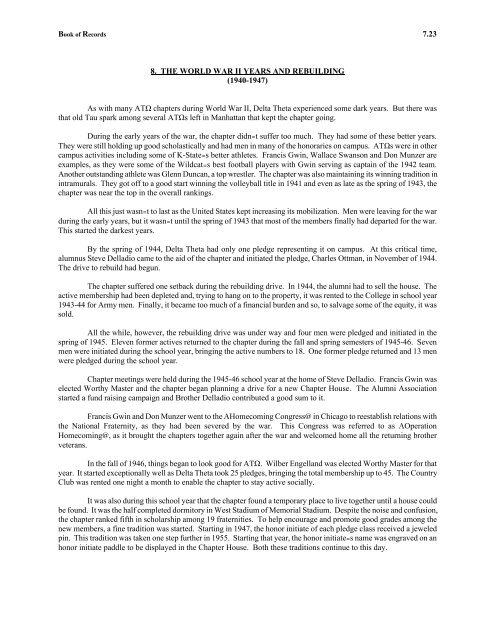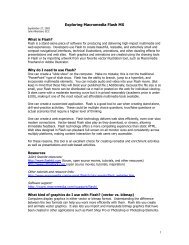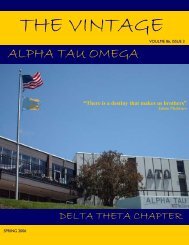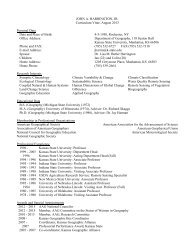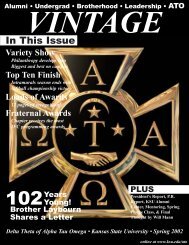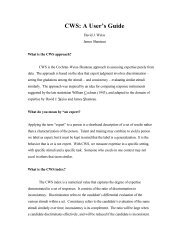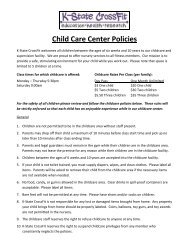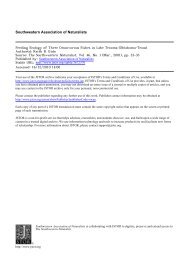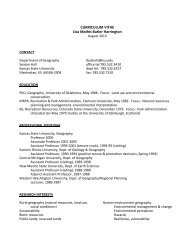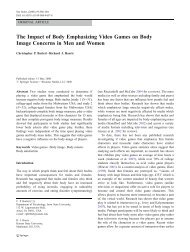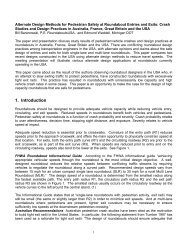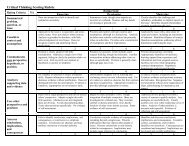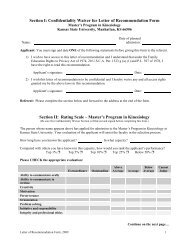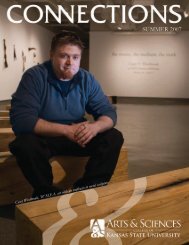book of records - Kansas State University
book of records - Kansas State University
book of records - Kansas State University
You also want an ePaper? Increase the reach of your titles
YUMPU automatically turns print PDFs into web optimized ePapers that Google loves.
Book <strong>of</strong> Records 7.23<br />
8. THE WORLD WAR II YEARS AND REBUILDING<br />
(1940-1947)<br />
As with many ΑΤΩ chapters during World War II, Delta Theta experienced some dark years. But there was<br />
that old Tau spark among several ΑΤΩs left in Manhattan that kept the chapter going.<br />
During the early years <strong>of</strong> the war, the chapter didn=t suffer too much. They had some <strong>of</strong> these better years.<br />
They were still holding up good scholastically and had men in many <strong>of</strong> the honoraries on campus. ΑΤΩs were in other<br />
campus activities including some <strong>of</strong> K-<strong>State</strong>=s better athletes. Francis Gwin, Wallace Swanson and Don Munzer are<br />
examples, as they were some <strong>of</strong> the Wildcat=s best football players with Gwin serving as captain <strong>of</strong> the 1942 team.<br />
Another outstanding athlete was Glenn Duncan, a top wrestler. The chapter was also maintaining its winning tradition in<br />
intramurals. They got <strong>of</strong>f to a good start winning the volleyball title in 1941 and even as late as the spring <strong>of</strong> 1943, the<br />
chapter was near the top in the overall rankings.<br />
All this just wasn=t to last as the United <strong>State</strong>s kept increasing its mobilization. Men were leaving for the war<br />
during the early years, but it wasn=t until the spring <strong>of</strong> 1943 that most <strong>of</strong> the members finally had departed for the war.<br />
This started the darkest years.<br />
By the spring <strong>of</strong> 1944, Delta Theta had only one pledge representing it on campus. At this critical time,<br />
alumnus Steve Delladio came to the aid <strong>of</strong> the chapter and initiated the pledge, Charles Ottman, in November <strong>of</strong> 1944.<br />
The drive to rebuild had begun.<br />
The chapter suffered one setback during the rebuilding drive. In 1944, the alumni had to sell the house. The<br />
active membership had been depleted and, trying to hang on to the property, it was rented to the College in school year<br />
1943-44 for Army men. Finally, it became too much <strong>of</strong> a financial burden and so, to salvage some <strong>of</strong> the equity, it was<br />
sold.<br />
All the while, however, the rebuilding drive was under way and four men were pledged and initiated in the<br />
spring <strong>of</strong> 1945. Eleven former actives returned to the chapter during the fall and spring semesters <strong>of</strong> 1945-46. Seven<br />
men were initiated during the school year, bringing the active numbers to 18. One former pledge returned and 13 men<br />
were pledged during the school year.<br />
Chapter meetings were held during the 1945-46 school year at the home <strong>of</strong> Steve Delladio. Francis Gwin was<br />
elected Worthy Master and the chapter began planning a drive for a new Chapter House. The Alumni Association<br />
started a fund raising campaign and Brother Delladio contributed a good sum to it.<br />
Francis Gwin and Don Munzer went to the AHomecoming Congress@ in Chicago to reestablish relations with<br />
the National Fraternity, as they had been severed by the war. This Congress was referred to as AOperation<br />
Homecoming@, as it brought the chapters together again after the war and welcomed home all the returning brother<br />
veterans.<br />
In the fall <strong>of</strong> 1946, things began to look good for ΑΤΩ. Wilber Engelland was elected Worthy Master for that<br />
year. It started exceptionally well as Delta Theta took 25 pledges, bringing the total membership up to 45. The Country<br />
Club was rented one night a month to enable the chapter to stay active socially.<br />
It was also during this school year that the chapter found a temporary place to live together until a house could<br />
be found. It was the half completed dormitory in West Stadium <strong>of</strong> Memorial Stadium. Despite the noise and confusion,<br />
the chapter ranked fifth in scholarship among 19 fraternities. To help encourage and promote good grades among the<br />
new members, a fine tradition was started. Starting in 1947, the honor initiate <strong>of</strong> each pledge class received a jeweled<br />
pin. This tradition was taken one step further in 1955. Starting that year, the honor initiate=s name was engraved on an<br />
honor initiate paddle to be displayed in the Chapter House. Both these traditions continue to this day.


